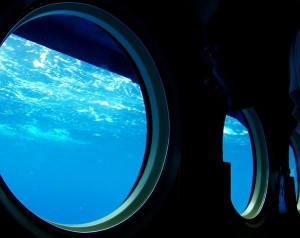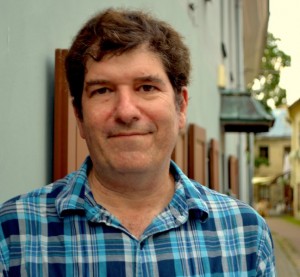Guest post by Robin Hemley

“Immersion writing engages the writer in the here and now in a journalistic sense, shaping and creating a story happening in the present while unabashedly lugging along all that baggage that makes up the writer’s personality: his or her memories, culture, and opinions.” — from A Field Guide for Immersion Writing: Memoir, Journalism, and Travel
I’ve published several different types of nonfiction over my career: travel writing, investigative journalism, and a memoir about the life of my sister Nola, a diagnosed schizophrenic. But in 2006, I had the idea to write a more active kind of memoir, with a storyline that hinged not only on the past but also on the present.
The book, Do-Over, chronicled my year-long attempts to return to the embarrassments and failures of my youth and take a second shot at them. I wasn’t trying to change the past (that’s impossible, obviously), but to change the way I viewed the past. The experiment, largely successful, brought me face to face with some perceived failures of the past and often sucker-punched me emotionally as I revived memories I had buried but not necessarily come to terms with. And so, I returned to summer camp, kindergarten, and my high school exchange program in Japan. I took a woman I’d had a crush when I was sixteen to a prom, lived again in one of my old childhood homes, and performed the same role in a play (the Heavenly Messenger in The Littlest Angel) as I had when I was seven and flubbed my lines. Ten do-overs in all.
When the book was published, I didn’t know how to categorize it. I didn’t like the term “stunt journalism” because it wasn’t journalism as such and I didn’t think it was a stunt. Entertaining, I hoped, but with a serious intent. As the father of four daughters, I wanted in part to investigate the realms of childhood as they are currently experienced, and contrast these versions with my own.
The term “immersion journalism” has been a round for a while, so I thought, why not add a new term, “immersion memoir”? Certainly, immersion writing of all kinds has seen a spike in popularity over the last decade. Writers such as A.J. Jacobs, Barbara Ehrenreich, and Ted Conover are some of the more popular practitioners, but to my knowledge, no one had written a book that identified the various forms of immersion writing.
I’ve attempted to fill this gap with A Field Guide for Immersion Writing: Memoir, Journalism, and Travel, in which I create both a practical guide for writers new to these genres as well as a meditation on various writers and how they fit into the world of immersion writing. Beyond that, I also detail what I hope is a useful taxonomy of the various forms of immersion.
In immersion memoir, the writer uses the world as a vehicle for writing about the Self (think: A.J. Jacobs and his books, such as The Year of Living Biblically, or my book, Do-Over). In immersion journalism, the writer uses the Self to write about the World (think Ehrenreich and Conover). In travel writing, the oldest form of immersion, the writer does both, writing about the writer in the world and the world in the writer.
I further delineate the categories by creating some subcategories (all of which are fluid and meant to help understand the various shapes of immersion writing rather than confine the writer): the Quest, the Experiment, the Reenactment, the Investigation, and the Infiltration. Travel writing, immersion journalism, and immersion memoir all contain versions of these subcategories, but depending on the type of writing, some are more important than others. For instance, the Quest is more integral to travel writing than to immersion journalism, though such works do exist in the latter.
I’ve also recast some familiar works as examples of immersion writing. To me, Hunter S. Thompson was an immersion memoirist (we learned at least as much about him as his subject in his work), as was James Agee in his wonderful immersion memoir Let Us Now Praise Famous Men, ostensibly about several families of white sharecroppers in Alabama in the 1930s, but again, he was quite revealing about himself.
I’ve tried to avoid writing about the usual suspects in the travel section of the book simply because if you have an interest in travel writing, you’re going to read Pico Iyer, Paul Theroux, and Bruce Chatwin. But you probably won’t run across Julio Cortazar’s Autonauts of the Cosmoroute, in which he and his wife spent more than a month travelling from one rest area to another between Paris and Marseilles without ever leaving the highway, or Xavier de Maistre’s Journey Around My Room, which chronicles an eighteenth-century French soldier’s confinement to his quarters for participating in a duel. To fight boredom, De Maistre turned his confinement into an ersatz travel book in which he wrote about his room as though he were on a great voyage of discovery. And in a sense, he was on such a voyage.
As I say in A Field Guide for Immersion Writing: Memoir, Journalism, and Travel, if your goal is to explore yourself, if you don’t mind being called an oddball (as I don’t!), then you’re more of a memoirist, as interested in your own transformation as in the rest of the world’s. But there’s overlap. There always is.
In all these forms of writing, self matters.
* * *

Robin Hemley
ROBIN HEMLEY is the author of ten books of nonfiction and fiction and the winner of many awards including a 2008 Guggenheim Fellowship, The Nelson Algren Award for Fiction from The Chicago Tribune, The Story Magazine Humor Prize, an Independent Press Book Award, two Pushcart Prizes. His fiction, nonfiction, and poetry has been published in the U.S., Great Britain, Germany, Japan, the Philippines, Hong Kong, and elsewhere and he teaches creative writing workshops around the world. He has been widely anthologized and has been published in The New York Times, The Believer, The Huffington Post, Orion, The Wall Street Journal, The Chicago Tribune, New York Magazine, and many U.S. literary magazines. The BBC is currently developing a feature film based on his book Invented Eden, which tells the story of a purported anthropological hoax in the Philippines. His third collection of short stories, Reply All, is forthcoming in 2012 from Indiana University Press (Break Away Books) and The University of Georgia Press recently published A Field Guide for Immersion Writing: Memoir, Journalism, and Travel. He is a Senior Editor of The Iowa Review as well as the editor of a popular online journal Defunct (Defunctmag.com), which features short essays on everything that’s had its day. He currently directs the Nonfiction Writing Program at The University of Iowa and is the founder and organizer of NonfictioNow, a biennial conference that will convene in November 2012 in Melbourne, Australia.